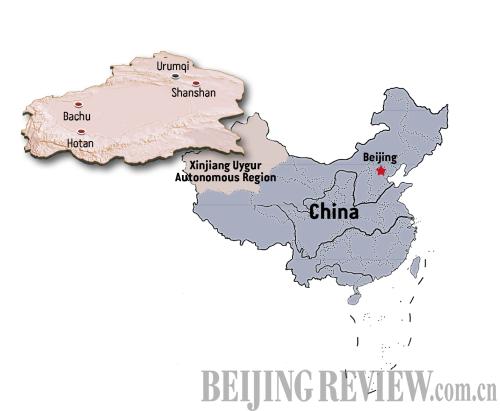|
After the June 26 attack in Xinjiang, EU Ambassador to China Markus Ederer said on July 1 that the EU believes "It is necessary to address the underlying causes of ethnic tensions in order to achieve lasting stability and prosperity."
Earlier, U.S. State Department spokesman Patrick Ventrell also criticized China's ethnic and religious policies, saying that the United States remained "deeply concerned" by the ongoing reports of discrimination and restrictions against Uygurs and Muslims in China.
"Terrorism is not only the enemy of the people of Xinjiang and China, but also the common enemy of human beings," Hua said on July 2.
The spokeswoman warned that it will harm the interests of oneself and others if one takes a double standard or adopts an indulgent policy on the issue.
Any responsible government would never condone such actions, instead, it would take resolute measures to protect the lives and property of its people and safeguard national stability, she said.
Ramesh Chopra, a senior Indian critic of strategic issues, said the terror attacks that occurred in Xinjiang, similar to those in other countries, were manipulated by international extremist forces.
The international community and every government should not give in to or connive with terrorists, he said, adding that they should strengthen cooperation to crack down on terrorism.
China has conducted anti-terror cooperation and exchanges and launched more than 10 such training sessions and drills with neighboring countries under the framework of the Shanghai Cooperation Organization (SCO).
The SCO, established on June 15, 2001, comprises China, Russia, Kazakhstan, Kyrgyzstan, Tajikistan and Uzbekistan. It originated and grew from the Shanghai Five mechanism, founded in 1996 by China, Russia, Kazakhstan, Kyrgyzstan and Tajikistan with the aim of strengthening confidence, carrying out disarmament in their border areas and promoting regional cooperation.
On June 29, two pacts on anti-terror cooperation among SCO members were ratified at the bimonthly session of the Standing Committee of the National People's Congress, China's top legislature.
One pact is on the procedures of organizing joint anti-terrorism drills among SCO members. The other is on the procedures of carrying out joint anti-terrorism actions in the territory of SCO members.
The activities of terrorists, separatists and extremists have been active in this region while drug trafficking from Afghanistan has increased and cross-border crimes happened from time to time, Yang Huanning, Vice Minister of Public Security, told lawmakers during the legislative session.
"The attacks in Xinjiang were launched by a tiny faction of extremists and separatists. It is not a religious or ethnic issue and this problem exists in many other countries around the world as well," said La Disheng, a professor at the Party School of Xinjiang Regional Committee of the Communist Party of China. "I believe with the firm hand of the government and cooperation with neighboring countries, this situation will be under control soon."
(With Yuan Yuan reporting from Urumqi and Kashgar)
Email us at: yinpumin@bjreview.com

Xinjiang Basics
Area: 1.66 million square km
Population: 21.81 million
Ethnic Groups: 47 ethnic groups, including Uygur, Han, Kazak, Kirgiz and Hui
Religions: Islam, Buddhism, Christianity and Shamanism | 